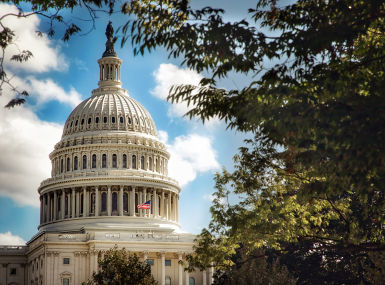Intergovernmental Roles and Responsibilities in Disaster Resilience

Upcoming Events
Related News
County governments across America play a critical role in preparing for or recovering from major disaster events. Over the past four decades, the United States has faced 387 climate-related disasters with damages at or exceeding $1 billion, a class of event often referred to as “billion-dollar disasters.” Collectively, these billion-dollar disasters have cost the U.S. economy more than $2.74 trillion and claimed the lives of 16,434 people. With the increasing frequency and severity of these major disasters, counties, states and the federal government need to coordinate efficiently and effectively to serve our communities. NACo with the support of The Pew Charitable Trusts has hosted three intergovernmental roundtable discussions with federal, state and county officials. The first roundtable identified priority challenges in achieving disaster resilience, while the second roundtable focused on defining and building local capacity for disaster resilient communities. The third and final roundtable explored current and potential approaches for funding and implementing solutions to the social and economic risks facing communities including those that are under resourced and underrepresented. The key findings of the intergovernmental roundtable discussions are provided below.
2024 Intergovernmental Roundtable
In February 2024, federal, state and county officials convened for a third and final roundtable event, exploring current and potential approaches for funding and implementing solutions to the social and economic risks facing communities including those that are under resources and underrepresented. This report features a summary of key findings and emphasizes the importance of taking action prior to a disaster taking place, with the economic costs of investment today dwarfed by those of an unprepared community. Participants highlighted three areas of intervention for intergovernmental partners to prioritize. These are:
- Streamline access to disaster mitigation, preparedness and relief funding
- Measure and address the economic risks of disasters, and
- Incorporate resilient practices in land use planning and development.
Read the executive summary here.
2023 Intergovernmental Roundtable
In February 2023, federal, state and county officials convened for a second roundtable event to outline a roadmap for how to define, improve and sustain local capacity for disaster resiliency and the roles intergovernmental partners can play in building resilient communities. This report features a summary of key findings, with disparities in local capacity found to be a top challenge in achieving disaster resilience. Participants agreed that to improve local capacity it must be defined and measured, identifying six key elements and developing solutions for intergovernmental partnerships to use in building and sustaining capacity. These elements are:
- Funding: For mitigation planning and project implementation
- Staffing: Dedicated personnel, and in some instances, dedicated resilience agencies
- Authority: To enact policy and practice that support mitigation efforts
- Partnerships: To maximize shared expertise, responsibility and resources
- Data & Data Analytics: To monitor and assess indicators of resilience for decision making
- Education: To ensure a reasonable perception of risk, among policymakers and residents
A webinar elaborating on the findings of this report took place on Wednesday, September 20, 2023. More information and the recording of that webinar are available here.
2022 Intergovernmental Roundtable
In February 2022, federal, state and county officials convened for a roundtable discussion to discuss roles and responsibilities across levels of government and the private sector for disaster resiliency efforts and identified top challenges in intergovernmental coordination and collaboration. This brief features a summary of takeaways and priority challenges in achieving disaster resilient communities across the country. Key takeaways include:
- Disaster response is led by local governments and the disasters they face are increasing in frequency and severity.
- Counties, especially small ones, may lack the capacity to take on an increasing demand for emergency management and recovery services.
- Disasters are variable and expensive, and spending is spread across multiple levels of government and private sector; this makes them both difficult to forecast and to afford.
- Federal disaster support is fragmented and in need of interagency coordination.
- The federal award and reimbursement processes are not designed for equitable allocation of resources, are complex and time-intensive to apply and sometimes awarded 3-4 years after a disaster event (requiring many localities to pursue private loans that incur interest).
- Emergency management practices that focus on mitigation produce a greater return than those focused on recovery, but uptake of mitigation-oriented practices is slow.
- Community engagement and education is important for increasing disaster preparedness.
- State and local leaders need reliable and actionable data for decision-making.
Featured Initiative
Intergovernmental Disaster Reform Task Force
As disasters intensify across the country, county governments play a crucial role on the frontlines of emergency management and recovery. With a commitment to advancing federal policies that foster collaboration between counties, federal agencies and other intergovernmental partners, the Task Force builds on years of county-led efforts to enhance disaster policies and practices, driving improved outcomes nationwide.

Resource
Intergovernmental Collaboration on Disaster Resilience Case Studies Series

Webinar
Defining and Building Capacity for Disaster Mitigation
SEP. 20, 2023
This National Preparedness Month, please join us for an engaging discussion of the key elements of capacity for disaster resilience.

Contact

Ashleigh Holand






